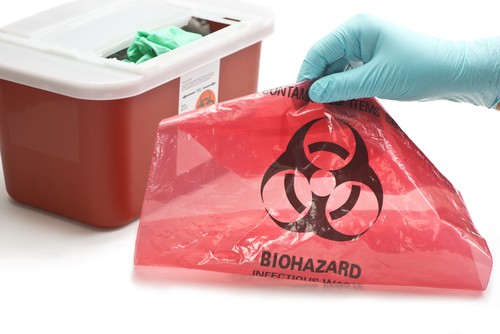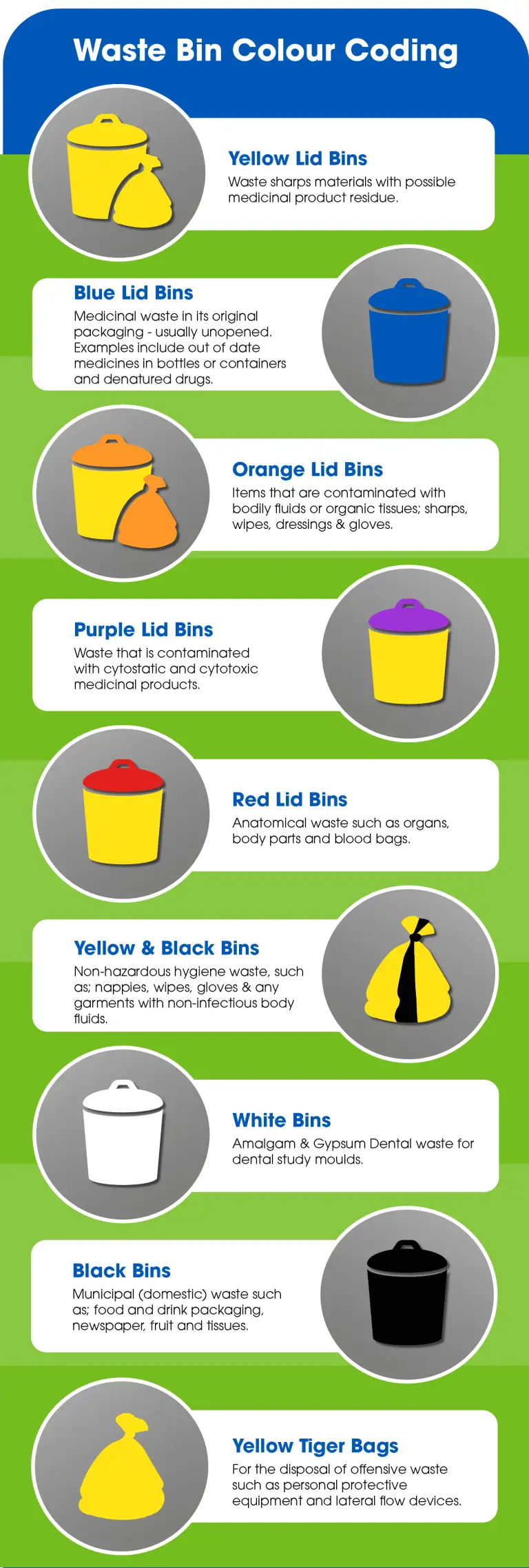Your Ally in Medical Waste Removal: Professional Service with Environmental Treatment
Wiki Article
The Value of Appropriately Handling Clinical Waste
Appropriate administration of medical waste is of utmost value in healthcare centers. The handling, storage, and disposal of medical waste call for rigorous adherence to laws and standards to guarantee the security of people, healthcare employees, and the environment. Healthcare centers have lawful and regulative responsibilities to appropriately handle medical waste, and failure to abide can result in penalties and lawful effects.Health And Wellness Threats Related To Improper Waste Monitoring
Incorrect management of clinical waste poses significant health and wellness threats to both health care employees and the general public - WasteX Medical Waste Disposal. Clinical waste, which includes sharps, infectious materials, drugs, and radioactive substances, needs correct handling and disposal to avoid the spread of infections, injuries, and direct exposure to hazardous compounds
One of the primary wellness dangers related to incorrect medical waste management is the transmission of transmittable illness. Health care employees who come right into call with contaminated waste might get illness such as HIV, hepatitis, or other bloodborne microorganisms. If clinical waste is not properly disposed of, it can contaminate the setting, water sources, and even food, leading to the spread of illness within the area (medical waste removal).
Incorrect waste management can additionally cause injuries, specifically from sharps such as needles, scalpels, and broken glass. Unintended needle punctures can cause the transmission of bloodborne illness, while cuts from sharp objects can cause serious wounds and infections.
Additionally, the improper disposal of pharmaceutical waste can result in the contamination of water materials. When run out or unused medications are flushed down the commode or disposed of inappropriately, the chemicals can leach right into water resources, influencing aquatic life and potentially getting in the human food chain.
Environmental Influence of Incorrectly Disposed Medical Waste
One of the significant effects of inadequate administration of medical waste is its damaging effect on the setting. Poorly disposed medical waste presents a serious danger to ecosystems, water bodies, and the total balance of the environment. WasteX Medical Waste Disposal. The unsafe materials consisted of in medical waste, such as contagious agents, pharmaceuticals, and chemicals, can contaminate air, dirt, and water, bring about extensive air pollution and destructionWhen clinical waste is not appropriately segregated, dealt with, and disposed of, it can locate its means into water bodies with inappropriate land fill techniques or unlawful disposing. This can lead to the contamination of groundwater and surface area water, influencing marine life and potentially contaminating alcohol consumption water sources. The launch of dangerous chemicals and pharmaceuticals right into the environment can disrupt communities and harm both animal and plant varieties.
In addition, improper incineration of clinical waste can launch harmful pollutants, including furans and dioxins, right into the atmosphere. These toxins have been linked to numerous health issues, including respiratory system issues, reproductive disorders, and even cancer cells. The release of greenhouse gases during incineration additionally adds to environment modification.
To minimize the environmental effect of poorly disposed clinical waste, it is crucial to implement proper waste management techniques. This includes segregation of waste at the source, proper treatment techniques, and secure disposal techniques. By doing so, we can lessen the air pollution and safeguard the atmosphere from the damaging consequences of clinical waste mismanagement.
Lawful and Governing Responsibilities for Healthcare Facilities
In order to attend to the ecological effect of poorly disposed clinical waste, healthcare centers are needed to comply with regulatory and lawful obligations. These commitments are established to ensure the appropriate handling, storage, transport, and disposal of medical waste in a secure and environmentally accountable way.One of the crucial lawful responsibilities for health care centers is to get the essential authorizations and licenses for handling clinical waste. This consists of getting a waste generator recognition number and abiding with federal, state, and neighborhood laws. Medical care centers have to additionally keep detailed records of the kinds and quantities of clinical waste created, along with the approaches utilized for its disposal.
Furthermore, health care centers should execute appropriate partition and product packaging procedures for different types of clinical waste, such as sharps, transmittable waste, and pharmaceutical waste - medical waste disposal service. This includes making use of leak-proof containers, biohazard bags, and sharps containers that meet governing standards
Healthcare centers are additionally liable for making certain that their team receive suitable training on the correct handling and disposal of clinical waste. This includes training on infection control, individual safety tools, and waste administration methods.
Finest Practices for Safe Handling and Disposal of Medical Waste
To guarantee the secure handling and disposal of medical waste, healthcare centers should execute best techniques. These techniques are vital to shield the health and wellness of both healthcare workers and the general public. The proper management of clinical waste is vital in preventing the spread of contagious conditions and decreasing ecological contamination.One of the best methods for risk-free handling and disposal of medical waste is segregation. Health care facilities must divide different sorts of medical waste, such as sharps, contagious products, and pharmaceutical waste, to avoid cross-contamination. Appropriate labeling and shade coding of waste containers also play an important function in making sure the proper segregation of medical waste.
An additional important best practice is using suitable containers for storing and carrying medical waste. These containers should be watertight, puncture-resistant, and properly secured to stop any possible launch of hazardous products. Furthermore, health care facilities need to establish clear protocols for the collection, storage space, and transportation of medical waste to reduce the threat of direct exposure and contamination.
In addition, health care facilities should train their staff on the correct handling and disposal of medical waste. Regular training sessions and refresher course programs need to be conducted to keep health care employees upgraded on the most current guidelines and regulations. This will certainly aid make certain that everybody associated with the procedure is mindful of the potential dangers and is geared up with the essential knowledge and abilities to manage clinical waste safely.
Education and Training for Healthcare Professionals in Waste Administration
Medical care experts require detailed education and learning and training in waste monitoring to guarantee the correct handling and disposal of clinical waste. The management of clinical waste is a crucial element of healthcare operations as it straight impacts the wellness and security of both health care workers and the basic public. Correct education and training outfit health care experts with the essential knowledge and skills to handle and get rid of of medical waste in a index environmentally responsible and risk-free way.Education and learning and training programs for medical care specialists in waste management cover a series of topics, consisting of the classification and segregation of clinical waste, proper packaging and labeling, transportation and storage space demands, and the use of individual protective tools. These programs likewise emphasize the importance of adherence to regional, national, and worldwide guidelines and guidelines controling clinical waste administration.
By getting comprehensive education and learning and training in waste administration, health care specialists can effectively decrease the risks connected with medical waste, such as the transmission of infectious diseases and the possible injury to the atmosphere. WasteX Medical Waste Disposal. In addition, trained professionals can recognize and apply best techniques that advertise sustainability and efficient waste administration practices within health care facilities.
Constant education and training in waste management should be a continuous top priority for healthcare experts, as waste administration practices and regulations might evolve gradually. By staying up-to-date with the most up to date growths in waste monitoring, medical care professionals can make sure that they are outfitted with the understanding and abilities needed to make enlightened choices and add to the overall enhancement of waste monitoring techniques in medical care setups.

Final Thought
In verdict, proper monitoring of medical waste is essential to minimize health risks and reduce the environmental impact. Healthcare centers have governing and lawful responsibilities to make certain safe handling and disposal of medical waste.
Medical care specialists require detailed education and learning and training in waste monitoring to guarantee the proper handling and disposal of medical waste - medical waste disposal. The management of clinical waste is a vital part of medical care procedures as it straight impacts the health and security of both health care workers and the general public
Report this wiki page